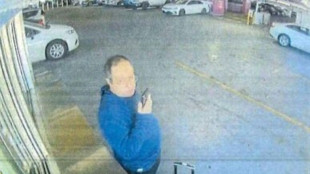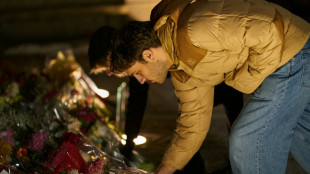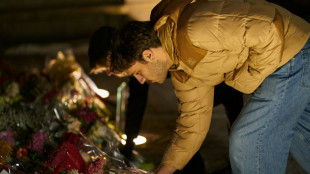
-
 Trump administration begins release of Epstein files
Trump administration begins release of Epstein files
-
UN Security Council votes to extend DR Congo mission by one year

-
 Family of Angels pitcher, club settle case over 2019 death
Family of Angels pitcher, club settle case over 2019 death
-
US university killer's mystery motive sought after suicide

-
 Rubio says won't force deal on Ukraine as Europeans join Miami talks
Rubio says won't force deal on Ukraine as Europeans join Miami talks
-
Burkinabe teen behind viral French 'coup' video has no regrets

-
 Brazil court rejects new Bolsonaro appeal against coup conviction
Brazil court rejects new Bolsonaro appeal against coup conviction
-
Three-time Grand Slam winner Wawrinka to retire in 2026

-
 Man Utd can fight for Premier League title in next few years: Amorim
Man Utd can fight for Premier League title in next few years: Amorim
-
Pandya blitz powers India to T20 series win over South Africa

-
 Misinformation complicated Brown University shooting probe: police
Misinformation complicated Brown University shooting probe: police
-
IMF approves $206 mn aid to Sri Lanka after Cyclone Ditwah

-
 Stocks advance as markets cheer weak inflation
Stocks advance as markets cheer weak inflation
-
Emery says rising expectations driving red-hot Villa

-
 Three killed in Taipei metro attacks, suspect dead
Three killed in Taipei metro attacks, suspect dead
-
Seven Colombian soldiers killed in guerrilla attack: army

-
 Amorim takes aim at Man Utd youth stars over 'entitlement'
Amorim takes aim at Man Utd youth stars over 'entitlement'
-
Mercosur meets in Brazil, EU eyes January 12 trade deal

-
 US Fed official says no urgency to cut rates, flags distorted data
US Fed official says no urgency to cut rates, flags distorted data
-
Rome to charge visitors for access to Trevi Fountain

-
 Spurs 'not a quick fix' for under-fire Frank
Spurs 'not a quick fix' for under-fire Frank
-
Poland president accuses Ukraine of not appreciating war support

-
 Stocks advance with focus on central banks, tech
Stocks advance with focus on central banks, tech
-
Amorim unfazed by 'Free Mainoo' T-shirt ahead of Villa clash

-
 PSG penalty hero Safonov ended Intercontinental win with broken hand
PSG penalty hero Safonov ended Intercontinental win with broken hand
-
French court rejects Shein suspension

-
 'It's so much fun,' says Vonn as she milks her comeback
'It's so much fun,' says Vonn as she milks her comeback
-
Moscow intent on pressing on in Ukraine: Putin

-
 UN declares famine over in Gaza, says 'situation remains critical'
UN declares famine over in Gaza, says 'situation remains critical'
-
Guardiola 'excited' by Man City future, not pondering exit

-
 Czechs name veteran coach Koubek for World Cup play-offs
Czechs name veteran coach Koubek for World Cup play-offs
-
PSG penalty hero Safonov out until next year with broken hand

-
 Putin says ball in court of Russia's opponents in Ukraine talks
Putin says ball in court of Russia's opponents in Ukraine talks
-
Czech Zabystran upsets Odermatt to claim Val Gardena super-G

-
 NGOs fear 'catastrophic impact' of new Israel registration rules
NGOs fear 'catastrophic impact' of new Israel registration rules
-
US suspends green card lottery after MIT professor, Brown University killings

-
 Arsenal in the 'right place' as Arteta marks six years at club
Arsenal in the 'right place' as Arteta marks six years at club
-
Sudan's El-Fasher under the RSF, destroyed and 'full of bodies'

-
 From farms to court, climate-hit communities take on big polluters
From farms to court, climate-hit communities take on big polluters
-
Liverpool have 'moved on' from Salah furore, says upbeat Slot

-
 Norway crown princess likely to undergo lung transplant
Norway crown princess likely to undergo lung transplant
-
Iraq negotiates new coalition under US pressure

-
 France's budget hits snag in setback for embattled PM
France's budget hits snag in setback for embattled PM
-
Putin hails Ukraine gains, threatens more, in annual press conference

-
 US suspends green card lottery after Brown, MIT professor shootings
US suspends green card lottery after Brown, MIT professor shootings
-
Chelsea's Maresca says Man City link '100 percent' speculation

-
 Dominant Head moves into Bradman territory with fourth Adelaide ton
Dominant Head moves into Bradman territory with fourth Adelaide ton
-
Arsenal battle to stay top of Christmas charts

-
 Mexican low-cost airlines Volaris and Viva agree to merger
Mexican low-cost airlines Volaris and Viva agree to merger
-
Border casinos caught in Thailand-Cambodia crossfire


Creeping ice clouding vision of Europe space telescope Euclid
Scientists are trying to melt a thin layer of ice that is increasingly clouding the vision of the "dark universe detective" space telescope Euclid, the European Space Agency said on Tuesday.
It is the latest of several technical setbacks for the wide-eyed telescope, which blasted off into space in July on a mission to chart a third of the sky.
By doing so, the ESA hopes Euclid will reveal out more about the nature of dark matter and dark energy, which are thought to make up 95 percent of the universe but remain shrouded in mystery.
During checks in November, the team on the ground first noticed that they were losing a little light coming into the telescope's visible light imager, Euclid instrument operations scientist Ralf Kohley told AFP.
After digging into the data, they believe the problem is a layer of ice -- thought to be just the width of a strand of DNA -- that is building up on the telescope's optical surfaces.
"It's a big problem," Kohley acknowledged.
But researchers have been working on it, Kohley said, adding that he had no doubt Euclid would be able to finish its mission.
Keeping out water is a common problem for all spacecrafts.
Despite best efforts on the ground, a tiny amount of water absorbed during a spacecraft's assembly on Earth can smuggle its way to space.
Faced with the cold vastness of space, the water molecules freeze to the first surface they can -- in this case, some may have landed on the Euclid's mirrors.
- Thin ice -
Shortly after the telescope launched, scientists used its on-board heaters to heat up everything on the spacecraft, hoping to blast out any potential water.
This could be done again.
"But heating out everything is very disruptive for the mission," Kohley said.
Because heat expands most materials, warming up the whole spacecraft involves careful recalibration.
It would take at least a month to get the telescope back to its job surveying the sky, Kohley said.
So last week, the ESA started warming just two of the telescope's mirrors, turning the temperature up just enough to hopefully melt away the ice.
This "minimally invasive" partial warming will last until Thursday, Kohley said.
The scientists may not know if it works until mid-April.
Part of the problem is that the scientists do not know exactly where the ice is accumulating -- or how much there is.
And even if the scientists do manage to melt the ice, it could come back over time, Kohley warned.
If the partial warming plan fails, the ESA will have to heat up the whole spacecraft.
If the team have to do this every year during the telescope's planned-six year mission it could result in a six-month delay, Kohley said.
"But that's all speculation," he said.
"For the moment, we have to wait and see -- and hope we can rid of this problem in a more elegant fashion."
It is not the first problem for Euclid.
Cosmic rays previously confused the spacecraft's fine guidance sensor, which required a complicated software update.
Some unwanted sunlight also interfered with its observations, a problem solved by slightly rotating the telescope, Kohley said.
However nothing can be done about particularly strong solar flares occasionally projecting X-ray images on the visible imager.
Euclid, which the ESA calls its "dark universe detective," officially started its survey last month.
Its first images, released in November, revealed swirling galaxies bursting with colour in the distant cosmos.
D.Moore--AMWN


